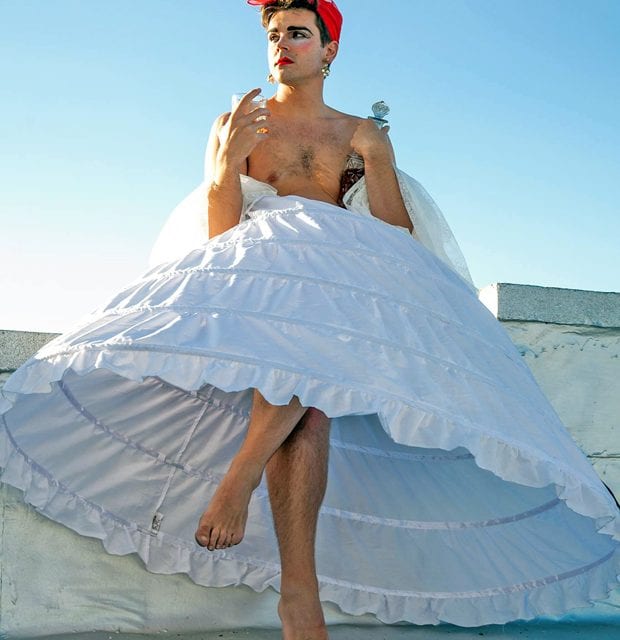How Dallas solo artist Brigham Mosley turned Scarlett O’Hara into his alter ego — and a metaphor for gay culture
ARNOLD WAYNE JONES | Executive Editor
jones@dallasvoice.com
It was the best of times, it was the worst of times for Brigham Mosley.
About three years ago, he was living in New York City, holding down “three or four jobs, like I always did,” while plying his art as a solo performer. But burgeoning success was also a wake-up call.
“Things were happening for me, but it was all super-downtown, queer theater,” he recalls. “It felt like such an ‘artist’s moment,’ on the one hand, but on the other hand I had no money.” Emotionally, professionally, spiritually rewarding work met the realization “that this was not a sustainable life. I felt like Scarlett O’Hara — Tara is burned, Atlanta is besieged … and what about me?”
Tomorrow may have seemed like another day, but at the time, he was worried. So that’s when Mosley wrote Scarlett O’Hara and the War on Tara, his long-form solo show in which he got to dress up in frock and fiddle-de-dee his way through his misgivings, all with the metaphor of Gone with the Wind at his back.
 Now, three years later, Mosley is back in Dallas — permanently. He’s happily engaged to his fiancé, a successful dancer. And he’s still pursuing his artistry. And he’s doing a quatrain down the boulevard of 12 Oaks, back to Tara again. Mosley is reviving his one-man show for the third annual Dallas Solo Fest. Only this time, the meaning has changed for him.
Now, three years later, Mosley is back in Dallas — permanently. He’s happily engaged to his fiancé, a successful dancer. And he’s still pursuing his artistry. And he’s doing a quatrain down the boulevard of 12 Oaks, back to Tara again. Mosley is reviving his one-man show for the third annual Dallas Solo Fest. Only this time, the meaning has changed for him.
“When I wrote it, it was definitely more about the economics — how could I justify my life as an artist,” he says. “I was younger and thinner and probably brighter, but there was a desperation there. Being a young artist, you feel all these doors are shutting. Now, there is more of a fear of a career happening and exploring artistic opportunities. Oh, and I’m getting older. How can I make my life happen before I die?”
These are heady concerns for someone only 30, but it’s from such crucibles of doubt that artistic iron is forged. Mosley’s New York experience jaded him, but it also steeled his resolve.
“There was a gay man shot in the back of the head in the West Village, a couple of blocks from where I worked. There was this vigil one night when I was walking home. This man, who was a queer activist, was speaking, but his speech was less about [the victim of the crime] than about this radical-artist self-promotion of his own blog. And that’s what Scarlett does [in my play]. It’s a critique of this progressive queer community, which I identify with, but you ask yourself, ‘Am I ethical as an artist?’”
As with Mosley’s show at last year’s Solo Fest, The Mo[u]rning After — named one of Dallas Voice’s best performances of 2015, by the way — Scarlett O’Hara “has autobiographical elements — there is more me in it that I would like to own up to,” he says. “But Mo[u]rning After gave names, dates, places. Scarlett is just someone I have always felt close to. Use her to explore the darker, more critical parts of myself. Scarlett can’t help herself. Like me, I don’t know what else I would do if I wasn’t making things. Scarlett doesn’t know how to not be in motion. It’s that propulsion of that character [I identify with].”
Mosley’s show is hardly the only one at the festival, however, as he enthusiastically acknowledges. “Dallas Solo Fest, and Brad McIntire especially, are so caring and supporting of the work of solo performers. I’ve done many festivals where they [don’t care as much]. I applaud his how eclectic it is. [McIntire] is having sort of national conversation among solo performers. I think Dallas needs more of this. It’s special — a real gem.”
This article appeared in the Dallas Voice print edition June 3, 2016.


